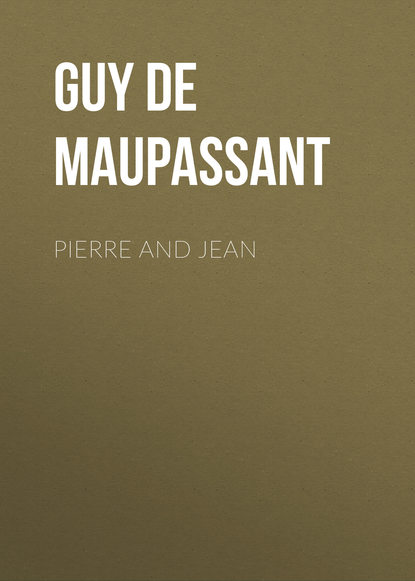По всем вопросам обращайтесь на: info@litportal.ru
(©) 2003-2024.
✖
Pierre and Jean
Настройки чтения
Размер шрифта
Высота строк
Поля
Now he contemplated the spoil – his fish – with the joyful thrill of a miser; seeing as he looked up at the sky that the sun was getting low: “Well, boys,” said he, “suppose we turn homeward.”
The young men hauled in their lines, coiled them up, cleaned the hooks and stuck them into corks, and sat waiting.
Roland stood up to look out like a captain.
“No wind,” said he. “You will have to pull, young ‘uns.”
And suddenly extending one arm to the northward, he exclaimed:
“Here comes the packet from Southampton.”
Away over the level sea, spread out like a blue sheet, vast and sheeny and shot with flame and gold, an inky cloud was visible against the rosy sky in the quarter to which he pointed, and below it they could make out the hull of the steamer, which looked tiny at such a distance. And to southward other wreaths of smoke, numbers of them, could be seen, all converging towards the Havre pier, now scarcely visible as a white streak with the lighthouse, upright, like a horn, at the end of it.
Roland asked: “Is not the Normandie due to-day?” And Jean replied:
“Yes, to-day.”
“Give me my glass. I fancy I see her out there.”
The father pulled out the copper tube, adjusted it to his eye, sought the speck, and then, delighted to have seen it, exclaimed:
“Yes, yes, there she is. I know her two funnels. Would you like to look, Mme. Rosemilly?”
She took the telescope and directed it towards the Atlantic horizon, without being able, however, to find the vessel, for she could distinguish nothing – nothing but blue, with a coloured halo round it, a circular rainbow – and then all manner of queer things, winking eclipses which made her feel sick.
She said as she returned the glass:
“I never could see with that thing. It used to put my husband in quite a rage; he would stand for hours at the windows watching the ships pass.”
Old Roland, much put out, retorted:
“Then it must be some defect in your eye, for my glass is a very good one.”
Then he offered it to his wife.
“Would you like to look?”
“No, thank you. I know before hand that I could not see through it.”
Mme. Roland, a woman of eight-and-forty but who did not look it, seemed to be enjoying this excursion and this waning day more than any of the party.
Her chestnut hair was only just beginning to show streaks of white. She had a calm, reasonable face, a kind and happy way with her which it was a pleasure to see. Her son Pierre was wont to say that she knew the value of money, but this did not hinder her from enjoying the delights of dreaming. She was fond of reading, of novels, and poetry, not for their value as works of art, but for the sake of the tender melancholy mood they would induce in her. A line of poetry, often but a poor one, often a bad one, would touch the little chord, as she expressed it, and give her the sense of some mysterious desire almost realized. And she delighted in these faint emotions which brought a little flutter to her soul, otherwise as strictly kept as a ledger.
Since settling at Havre she had become perceptibly stouter, and her figure, which had been very supple and slight, had grown heavier.
This day on the sea had been delightful to her. Her husband, without being brutal, was rough with her, as a man who is the despot of his shop is apt to be rough, without anger or hatred; to such men to give an order is to swear. He controlled himself in the presence of strangers, but in private he let loose and gave himself terrible vent, though he was himself afraid of every one. She, in sheer horror of the turmoil, of scenes, of useless explanations, always gave way and never asked for anything; for a very long time she had not ventured to ask Roland to take her out in the boat. So she had joyfully hailed this opportunity, and was keenly enjoying the rare and new pleasure.
From the moment when they started she surrendered herself completely, body and soul, to the soft, gliding motion over the waves. She was not thinking; her mind was not wandering through either memories or hopes; it seemed to her as though her heart, like her body, was floating on something soft and liquid and delicious which rocked and lulled it.
When their father gave the word to return, “Come, take your places at the oars!” she smiled to see her sons, her two great boys, take off their jackets and roll up their shirt-sleeves on their bare arms.
Pierre, who was nearest to the two women, took the stroke oar, Jean the other, and they sat waiting till the skipper should say: “Give way!” For he insisted on everything being done according to strict rule.
Simultaneously, as if by a single effort, they dipped the oars, and lying back, pulling with all their might, began a struggle to display their strength. They had come out easily, under sail, but the breeze had died away, and the masculine pride of the two brothers was suddenly aroused by the prospect of measuring their powers. When they went out alone with their father they plied the oars without any steering, for Roland would be busy getting the lines ready, while he kept a lookout in the boat’s course, guiding it by a sign or a word: “Easy, Jean, and you, Pierre, put your back into it.” Or he would say, “Now, then, number one; come, number two – a little elbow grease.” Then the one who had been dreaming pulled harder, the one who had got excited eased down, and the boat’s head came round.
But to-day they meant to display their biceps. Pierre’s arms were hairy, somewhat lean but sinewy; Jean’s were round and white and rosy, and the knot of muscles moved under the skin.
At first Pierre had the advantage. With his teeth set, his brow knit, his legs rigid, his hands clinched on the oar, he made it bend from end to end at every stroke, and the Pearl was veering landward. Father Roland, sitting in the bows, so as to leave the stern seat to the two women, wasted his breath shouting, “Easy, number one; pull harder, number two!” Pierre pulled harder in his frenzy, and “number two” could not keep time with his wild stroke.
At last the skipper cried: “Stop her!” The two oars were lifted simultaneously, and then by his father’s orders Jean pulled alone for a few minutes. But from that moment he had it all his own way; he grew eager and warmed to his work, while Pierre, out of breath and exhausted by his first vigorous spurt, was lax and panting. Four times running father Roland made them stop while the elder took breath, so as to get the boat into her right course again. Then the doctor, humiliated and fuming, his forehead dropping with sweat, his cheeks white, stammered out:
“I cannot think what has come over me; I have a stitch in my side. I started very well, but it has pulled me up.”
Jean asked: “Shall I pull alone with both oars for a time?”
“No, thanks, it will go off.”
And their mother, somewhat vexed, said:
“Why, Pierre, what rhyme or reason is there in getting into such a state. You are not a child.”
And he shrugged his shoulders and set to once more.
Mme. Rosemilly pretended not to see, not to understand, not to hear. Her fair head went back with an engaging little jerk every time the boat moved forward, making the fine wayward hairs flutter about her temples.
But father Roland presently called out:
“Look, the Prince Albert is catching us up!”
They all looked round. Long and low in the water, with her two raking funnels and two yellow paddle-boxes like two round cheeks, the Southampton packet came ploughing on at full steam, crowded with passengers under open parasols. Its hurrying, noisy paddle-wheels beating up the water which fell again in foam, gave it an appearance of haste as of a courier pressed for time, and the upright stem cut through the water, throwing up two thin translucent waves which glided off along the hull.
When it had come quite near the Pearl, father Roland lifted his hat, the ladies shook their handkerchiefs, and half a dozen parasols eagerly waved on board the steamboat responded to this salute as she went on her way, leaving behind her a few broad undulations on the still and glassy surface of the sea.
There were other vessels, each with its smoky cap, coming in from every part of the horizon towards the short white jetty, which swallowed them up, one after another, like a mouth. And the fishing barks and lighter craft with broad sails and slender masts, stealing across the sky in tow of inconspicuous tugs, were coming in, faster and slower, towards the devouring ogre, who from time to time seemed to have had a surfeit, and spewed out to the open sea another fleet of steamers, brigs, schooners, and three-masted vessels with their tangled mass of rigging. The hurrying steamships flew off to the right and left over the smooth bosom of the ocean, while sailing vessels, cast off by the pilot-tugs which had hauled them out, lay motionless, dressing themselves from the main-mast to the fore-tops in canvas, white or brown, and ruddy in the setting sun.
Mme. Roland, with her eyes half-shut, murmured: “Good heavens, how beautiful the sea is!”
And Mme. Rosemilly replied with a long sigh, which, however, had no sadness in it:
“Yes, but it is sometimes very cruel, all the same.”
Roland exclaimed:
“Look, there is the Normandie just going in. A big ship, isn’t she?”
Then he described the coast opposite, far, far away, on the other side of the mouth of the Seine – that mouth extended over twenty kilometres, said he. He pointed out Villerville, Trouville, Houlgate, Luc, Arromanches, the little river of Caen, and the rocks of Calvados which make the coast unsafe as far as Cherbourg. Then he enlarged on the question of the sand-banks in the Seine, which shift at every tide so that even the pilots of Quilleboeuf are at fault if they do not survey the channel every day. He bid them notice how the town of Havre divided Upper from Lower Normandy. In Lower Normandy the shore sloped down to the sea in pasture-lands, fields, and meadows. The coast of Upper Normandy, on the contrary, was steep, a high cliff, ravined, cleft and towering, forming an immense white rampart all the way to Dunkirk, while in each hollow a village or a port lay hidden: Etretat, Fecamp, Saint-Valery, Treport, Dieppe, and the rest.
The two women did not listen. Torpid with comfort and impressed by the sight of the ocean covered with vessels rushing to and fro like wild beasts about their den, they sat speechless, somewhat awed by the soothing and gorgeous sunset. Roland alone talked on without end; he was one of those whom nothing can disturb. Women, whose nerves are more sensitive, sometimes feel, without knowing why, that the sound of useless speech is as irritating as an insult.

















